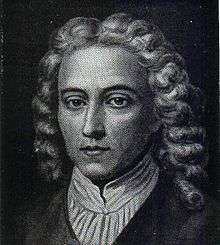Ode on Solitude

"Ode on Solitude" is a poem by Alexander Pope, written when he was twelve years old,[1][2] and widely included in anthologies.[3][4][5]
The title of this poem was also used by other poets, such as Joseph Warton.
Poem
Happy the man, whose wish and care
A few paternal acres bound,
Content to breathe his native air,
In his own ground.
Whose herds with milk, whose fields with bread,
Whose flocks supply him with attire,
Whose trees in summer yield him shade,
In winter fire.
Blest! who can unconcern'dly find
Hours, days, and years slide soft away,
In health of body, peace of mind,
Quiet by day,
Sound sleep by night; study and ease
Together mix'd; sweet recreation,
And innocence, which most does please,
With meditation.
Thus let me live, unseen, unknown;
Thus unlamented let me die;
Steal from the world, and not a stone
Tell where I lie.
References
- ↑ Genetic studies of genius by Lewis Madison Terman Stanford University Press, 1925 OCLC: 194203
- ↑ "Personhood, Poethood, and Pope: Johnson's Life of Pope and the Search for the Man Behind the Author" by Mannheimer, Katherine. Eighteenth-Century Studies - Volume 40, Number 4, Summer 2007, pp. 631-649 MUSE
- ↑ A Book of English pastoral verse by John Barrell; John Bull. New York : Oxford University Press, 1975. ISBN 978-0-19-519798-3
- ↑ "Turning Readers into Spectators: Pope's 'Ode on Solitude' and the Frame of Representation" by: John Higgins English Academy Review, Volume 10, Issue 1 December 1993 , pages 56 - 65
- ↑ "Solitude and the Neoclassicists" by Raymond D. Havens ELH, Vol. 21, No. 4 (Dec., 1954), pp. 251-273 doi:10.2307/2871883